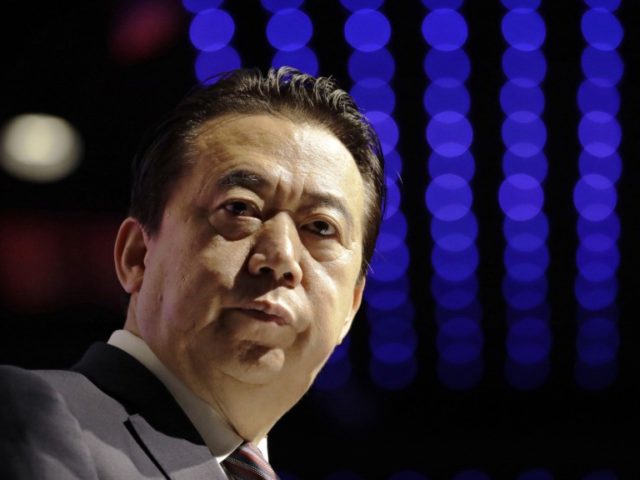The government of China published images Thursday of a hearing in Tianjin for Meng Hongwei, the former president of Interpol, in which Meng allegedly confessed to taking over $2 million in bribes while being in charge of China’s national police forces.
Meng disappeared on a visit to China in September 2018 and was not formally charged with a crime until May. Prior to his disappearance, he had upset the communist government by rejecting a request for a “red alert,” which urges Interpol member parties to seek out and arrest an individual, for Dolkun Isa, the head of the World Uyghur Congress, a Uyghur rights group critical of Chinese human rights abuses.
China’s Global Times state propaganda outlet reported that Meng will not undergo a trial because he pleaded guilty to the crimes he stands accused of. Chinese media claimed that Meng took “advantage of the convenience, power and status generated from his posts to seek benefits for others, illegally accepting money and gifts worth more than 14.46 million yuan from 2005 to 2017.”
Meng reportedly confessed before the court and “repented.” He now awaits another hearing to confirm his sentence.
Wife Grace Meng, who received political asylum in France following her husband’s disappearance, questioned if the man in photos from the Tianjin court was her husband or a body double, used to hide the abuse that Chinese police may have inflicted on the real Meng or, potentially, his murder. Meng called the trial a “fake case” against her husband and told the Associated Press (AP) that she was “proud of him” regardless of what the Chinese government claims.
“No matter how they insult him or frame him, they can’t change the facts: He is worthy of his motherland, worthy of police honor, and worthy of the people who love him,” Meng reportedly said. “The international community will know the truth.”
Meng Hongwei had barely served two years as the president of Interpol, the first Chinese citizen to hold the post, when he disappeared in late September. Meng had traveled home from France, where Interpol is headquartered, to visit family, wife Grace Meng said, when she abruptly stopped hearing from him. Grace Meng said that the last communication she received from her husband was a text message reading “wait for my call” and a knife emoji, which she interpreted as a signal that he was in danger. At the time of his disappearance, Meng also served as “vice-minister of public security” for Communist Party and was a member of the Party in good standing.
China finally responded to global demands for information on Meng in October, announcing that they had arrested him for taking “huge” bribes but not specifying what charges he faced. State media celebrated his arrest as a representation of “China’s strong determination to fight corruption” and condemned the global outcry for more information.
“The investigation of Meng is very timely …which shows that there’s no privilege or exception in the face of laws, and no person can escape punishment if he or she violates the law,” said a Public Security Ministry statement.
The Global Times accused “Western media” of showing “disrespect for Chinese law” by reporting on Meng’s stunning disappearance.
“The Western media deliberately used such words as ‘disappearing’ and ‘missing’ to attack China’s political system,” the Times claimed. “They are still using these words even after the official statement was released.”
At the time, the Chinese government had offered no proof that Meng was alive and safe, or that he was even in China, hence reports that he had “disappeared.”
The Chinese Communist Party expelled Meng Hongwei in March and formally charged him with a crime in May, seven months after his disappearance.
Interpol itself did not officially condemn his disappearance or attempt to rescue its president in any way. Interpol Secretary General Juergen Stock insisted that Interpol was “not an investigative body” in November and called Meng’s abduction a “sovereign” matter.
“We have to accept, like we would accept with any other country, that this country (China) is taking sovereign decisions and if that country tells us: ‘we have investigations, they are ongoing, and the president has been resigning, he’s not a delegate of the country anymore,’ then we have to accept,” Stock said.
His remarks contrasted significantly with then-acting and current full president of Interpol, Kim Jong Yang, who condemned Stock.
“I find it regrettable that the top leader of the organisation had to go out this way and that we weren’t specifically notified of what was happening in advance,” Kim said. “We still don’t have sufficient information about what’s happening [with Meng] or whether it has anything to do with Chinese domestic politics.”
Chinese Communist Party leader Xi Jinping is at the forefront of a nationwide campaign against corruption that has ensnared thousands. It took Xi little time after announcing the move to urge his anti-graft committee to move away from targeting corruption and instead identify “political deviation” among Party members.
Meng’s “deviation” may have been not allowing Interpol to be used to target human rights activists whose existence is inconvenient to China. In February 2018, Interpol publicly announced it would cancel a “red alert” for Isa, the head of the World Uyghur Congress, because it did not have evidence that he was a “terrorist,” as China claimed. Isa regularly condemns China on the international stage for its abuses against ethnic Uighurs, which have escalated into the mass construction of concentration camps in which survivors say Uighurs are forced to eat meat (against their Muslims teachings), learn Mandarin, and memorize songs praising Xi Jinping and the Communist Party. Those who resist suffer extreme torture, including electroshock and sleep deprivation.

COMMENTS
Please let us know if you're having issues with commenting.